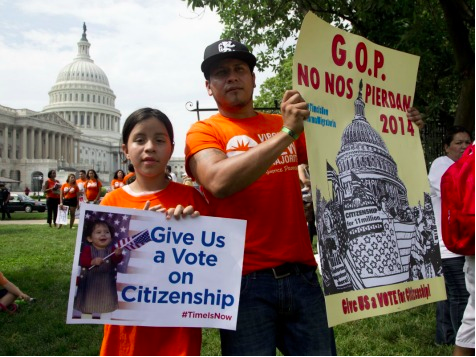While President Obama touts his executive amnesty and Republicans rail against it, many of the implications and plans are still unknown, according to a new report from the Center for Immigration Studies.
Legal policy analyst Jon Feere of the anti-amnesty group argues that even though the Department of Homeland Security outlined the executive actions in memos, many of the details of those actions are yet to be determined.
“These memos are a reminder that one can’t think of Obama’s lawless amnesty scheme as settled law,” Feere explains. “Not only are these plans currently a work-in-progress, any provision can change on a whim or be expanded in the future with nothing more than Obama’s pen.”
In his report, Feere argues that the memos are simply the beginning of a process of executive branch policy making.
“It is very possible that Americans will not know how Obama’s new immigration scheme will operate until it is already up and running,” he writes in the report.
For example, Feere highlights that the executive branch still has yet to offer definitions in some instances. For example, of “extreme hardship” when dealing with waivers for immigrant visa applicants who are a U.S. citizen or legal permanents resident’s spouse, child, or parent.
“More notable is the fact that [DHS Sec. Jeh] Johnson notes that the statute ‘does not define the term, and federal courts have not specifically defined it through case law.’ In other words, the administration is going to come up with as-of-yet unseen guidelines about the definition of ‘extreme hardship’ that Johnson notes ‘would provide broader use’ of the waiver,” Feere writes.
The report further considers whether the changes and rule making will need to go through the process of notice and comment laid out in the Administrative Procedures Act. But Feere doubts the Obama administration will actually go through that process.
“On August 15, 2012, the administration started taking applications for its Deferred Action program, but it was not until a day later, August 16, that a Federal Register notice appeared soliciting public comments,” Feere writes. “The notice did not offer any detailed rules that were being applied, but instead sought feedback about the form DHS had come up with for vetting applicants. As one expert asked: ‘[H]ow serious can an agency be in posting anything for review and comment when it has already begun taking applications?'”

COMMENTS
Please let us know if you're having issues with commenting.